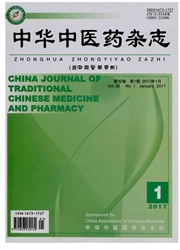

 中文摘要:
中文摘要:
文章通过回顾焦虑症与免疫系统异常的研究现状,探讨了焦虑症和免疫异常互致的机制。同时针对目前中医药欠缺对焦虑症研究的现状,结合本团队研究成果,提出以下几点建议:从应激医学入手研究焦虑症,探寻贴近焦虑症的动物模型;重视中医"肝"系统和肝郁证候及其相关衍化证候在焦虑症中的研究;发挥中医辨证论治的特长,注重病证结合中医动物模型的运用;甄选相应的方剂佐证模型和治疗模型;重视研究靶点在免疫系统的中药在焦虑症治疗中作用机制研究。通过以上几点建议,以期为中医药研究焦虑症提供新的思路。
 英文摘要:
英文摘要:
By reviewing the research on immunological changes caused by anxiety disorder, to explore the mechanism that there was an interaction effect between anxiety disorder and immunological changes. Furthermore, combined with an achievement of our own research, some suggestions were given for the development of traditional Chinese medicine(TCM) in anxiety disorder that lack of modern research. Firstly, to establish successfully an animal model of anxiety disorder, it should attach importance to learn much from stress medicine. Secondly, during the research, it should pay much attention to the TCM "liver" and the syndrome of stagnation of the liver qi or other syndromes caused by the syndrome of stagnation of the liver qi, which related closely to the emotional diseases. Thirdly, application of treatment based on syndrome differentiation, a characteristic of TCM, should be adopt in the animal model with combination of disease and syndrome. Fourthly, suitable prescription should be selected, as a strong evidence for an animal model as well as a treatment method for the model. The final point was that some Chinese drugs which had a good effect on immune system as well as anxiety disorder should be particularly considered. In the end, some effective ways and some new thoughts were hoping to be provided for the TCM research of anxiety disorder.
 同期刊论文项目
同期刊论文项目
 同项目期刊论文
同项目期刊论文
 Neuropeptide Y and leptin receptor expression in the hypothalamus of rats with chronic immobilizatio
Neuropeptide Y and leptin receptor expression in the hypothalamus of rats with chronic immobilizatio Integrated traditional and western medicine based on syndrome differentiation for treatment of depre
Integrated traditional and western medicine based on syndrome differentiation for treatment of depre Development and Evaluation of Chinese Medicine Fire-Heat Syndrome Scale in Oral Cavity for Measuring
Development and Evaluation of Chinese Medicine Fire-Heat Syndrome Scale in Oral Cavity for Measuring Diagnosis Analysis of 4 TCM Patterns in Sub-Optimal Health Status: a Structural Equation Modelling A
Diagnosis Analysis of 4 TCM Patterns in Sub-Optimal Health Status: a Structural Equation Modelling A Dual immunofluorescence study of NPY and ob-R in ARC of hypothalamus of rats with chronic immobiliza
Dual immunofluorescence study of NPY and ob-R in ARC of hypothalamus of rats with chronic immobiliza Development and Evaluation of a Traditional Chinese Medicine Syndrome Questionnaire for Measuring Su
Development and Evaluation of a Traditional Chinese Medicine Syndrome Questionnaire for Measuring Su 期刊信息
期刊信息
